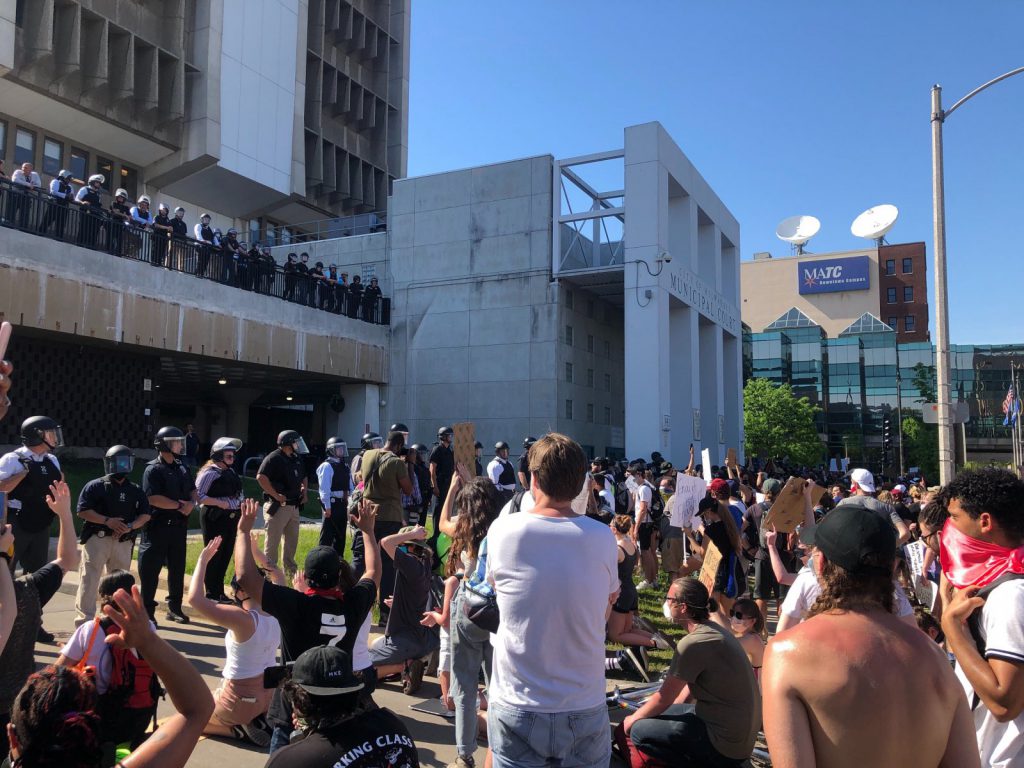Council Okays Planning for 10% Police Cut
Requires city budget office to model what cut would look like, in time for fall budget debate.
Milwaukee residents will soon have a better sense of what reallocating almost $30 million from the Milwaukee Police Department to other services would look like.
The Milwaukee Common Council, on a 13-2 vote Tuesday morning, approved a resolution authored by Alderman Jose G. Perez that requests the city budget office to model cutting 10 percent from the department’s budget.
The move does not cut 10 percent from the department’s $297,366,419 budget in 2020, but will provide guidance on how a reallocation could look in 2021. The police department said it would result in the loss of 375 — or 21 percent — of the department’s approximately 1,800 officers.
“Everyone gets a clear picture of what a 10 percent reduction looks like,” said Ald. Robert Bauman in praise of Perez’ proposal. “I think this is an excellent exercise in gathering information, being able to bring it back to our constituents in adequate time to inform the budget process.”
Mayor Tom Barrett will present his budget proposal to the Common Council in late September, with the council adopting a final budget in November. Last year over 90 amendments were considered.
Perez said the marchers in the streets are being heard.
“I think we all know that the system is a little broken,” said Alderwoman Milele A. Coggs.
Ald. Ashanti Hamilton said a cut to the police department isn’t an indictment of the individuals working for it. “I want to make something perfectly clear. I don’t think there is anyone on the council that isn’t supportive of police officers,” he said.
He said the potential move would reflect a change in strategy, one intended to give support to officers and to the communities they serve. “There is an unsustainable path we are going down to think we can police our way to stable neighborhoods,” said Hamilton. “Quite honestly, we have to start making our actions match this rhetoric we often use.”
Hamilton said when council members Coggs and Nik Kovac were first elected in 2008 they changed the discussion.
Kovac said he has received over 2,000 emails regarding the issue in the past few weeks, including hundreds from his constituents.
The East Side and Riverwest alderman said Milwaukee could have easily been in the national spotlight that Minneapolis finds itself in. “If there was bodycam footage of what happened to Joel Acevedo, if there was bodycam footage of Dontre Hamilton, we could have been the city,” said Kovac. Acevedo was killed with a chokehold from an off-duty officer in April. The officer faces a homicide charge, but has not been terminated. Hamilton was killed in 2014 in Red Arrow Park.
Kovac stressed that the proposed change in the police budget doesn’t mean you call 911 and no one answers.
“There are words like abolish, there are words like defund. To me, the words I have always wanted to use are ‘radical transformation of responsibilities,'” he said.
“I talk to a lot of police officers, it’s often said they are the social workers of first resort, that’s not a role they should be in, as a lot of them will say,” said Ald. Scott Spiker.
But Spiker, along with council member Mark Borkowski, didn’t vote for the model. That’s “a huge number of positions,” Spiker said of the proposed reduction.
But others have challenged the suggestion of 375 put forth by the Milwaukee Police Department. We’ll examine the claim in a future article.
The city budget office will now have to model what the cut would actually look like in terms of personnel and what funds would be available to be used elsewhere.
Is a 10 percent cut what the community wants? Ald. Russell W. Stamper, II said he has heard from the community that more may be desired. “The community wasn’t too satisfied with that, and I don’t blame them,” he said of the resolution’s announcement Monday.
Grant Update
The Common Council unanimously voted to authorize the receipt of seven federal grants related to the police department during Tuesday’s meeting. Each of the grants was previously budgeted for and does not represent an expansion of the department.
Included in the awards were a 2020 Beat Patrol Program grant ($126,714), five 2020 High-Intensity Drug Trafficking Area grants ($422,602 total) and a Milwaukee Metropolitan Drug Enforcement Grant ($166,864).
Each required a local match — ranging from 25 percent to 76 percent — to receive the funds.
If you think stories like this are important, become a member of Urban Milwaukee and help support real, independent journalism. Plus you get some cool added benefits.
More about the 2020 Racial Justice Protests
- Plea Agreement Reached On Long-Pending Sherman Park Unrest Charges Involving Vaun Mayes - Jeramey Jannene - Oct 17th, 2024
- Rep. Ryan Clancy Settles With City Following 2020 Curfew Arrest - Jeramey Jannene - Dec 12th, 2023
- Supervisor Clancy Applauds Settlement in Clancy vs. City of Milwaukee - State Rep. Ryan Clancy - Dec 12th, 2023
- Tosa Protest Assails Federal Court Decision Exonerating Police - Isiah Holmes - May 9th, 2023
- Wauwatosa ‘Target List’ Trial Begins - Isiah Holmes - May 3rd, 2023
- Shorewood Spitter Found Guilty For 2020 Protest Confrontation - Jeramey Jannene - Apr 20th, 2023
- City Hall: City Will Pay 2020 George Floyd Protester $270,000 - Jeramey Jannene - Feb 14th, 2023
- Tosa Protest Tickets Dismissed - Isiah Holmes - Jul 21st, 2022
- Op Ed: ‘We Need More’ - Charles Q. Sullivan - Mar 4th, 2022
- Milwaukee Officers Circulate “2020 Riot” Coins? - Isiah Holmes - Nov 14th, 2021
Read more about 2020 Racial Justice Protests here
Political Contributions Tracker
Displaying political contributions between people mentioned in this story. Learn more.
- December 13, 2018 - José G. Pérez received $50 from Mark Borkowski
City Hall
-
Council Blocked In Fight To Oversee Top City Officials
 Dec 16th, 2025 by Jeramey Jannene
Dec 16th, 2025 by Jeramey Jannene
-
Latest Effort to Adopt New Milwaukee Flag Going Nowhere
 Dec 3rd, 2025 by Jeramey Jannene
Dec 3rd, 2025 by Jeramey Jannene
-
After Deadly May Fire, Milwaukee Adds New Safety Requirements
 Dec 2nd, 2025 by Jeramey Jannene
Dec 2nd, 2025 by Jeramey Jannene























I hope that the Mayor and Council proceed very carefully. As Ald. Kovac suggests, changes in funding should be associated with expectations about service level priorities and responsibilities.
As things stand now, the City Budget is already facing huge challenges as a result of revenue shortfalls related to the economic impact of the pandemic. I would like to see local officials lead the community’s efforts to demand Congress’ and the President’s attention to local government budget challenges.
It’d be useful to review/report on the recommendations of the many BLOC members who testified at the 2020 budget hearing.